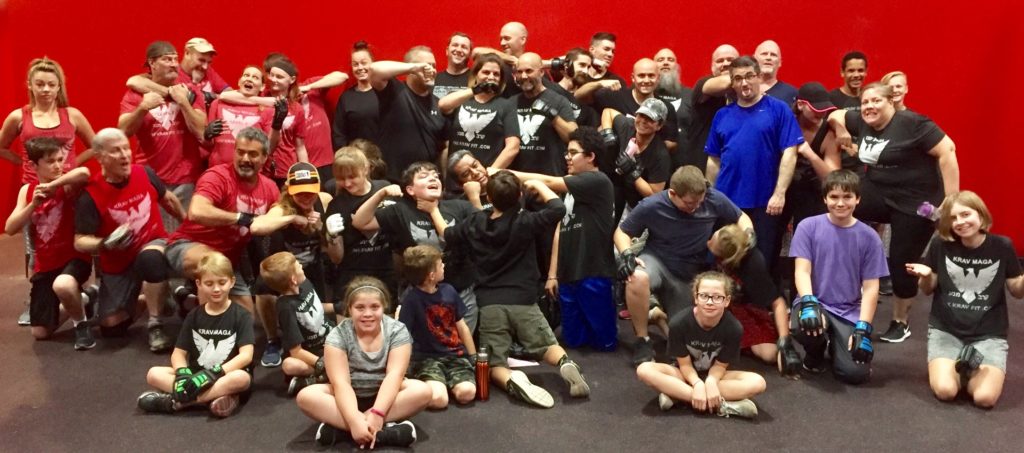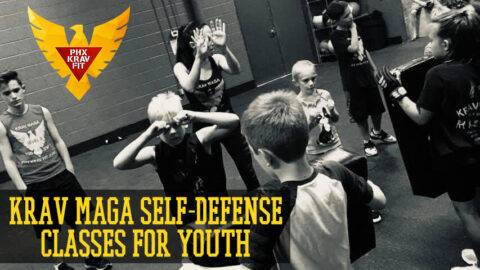16 Amazing Tips You Have To Know: Before Joining Any Martial Arts School
Many survivalists, law enforcement personnel, preppers, business owners and your average everyday civilians want to train in self-defense through the martial arts. When looking for a martial arts school, there are many things one has to take into consideration. As a martial art's student and instructor, I have discovered 16 tips everyone should take into account before making a decision on which school to sign up with (yes, even with my schools).

Many of these aspects come from the numerous complaints I get from people who got the wool pulled over their eyes before and after signing on the dotted line. In all honesty, a couple of these items even used to be weak points of my own schools before I realized these were also the ingredients to creating a high quality place to learn. Therefore, I hope to help students and instructors at PhxKravFit with this information, as I wish I would have known this information before I opened up my business.
Please understand these are not in any specific order, as each one might serve a different priority to each individual.
However, all of them are important, so pay close attention because many martial arts schools either disregard this information directly or indirectly, costing you in the end. In other words, most schools will not improve or don’t know how to implement these points, and put out the extra energy, time and resources. Unfortunately, these are the people who make a bad name for martial arts school businesses (directly or indirectly), and make so many people lose out on the massive benefits martial arts gives.
- Know what your goal is, especially in relation to what the school teaches. Everyone might have their own reason for wanting to join a specific martial arts class. Some want to learn how to truly defend themselves, others may want to actually compete in tournaments, while still others want the cultural focus and background of a traditional art. My point is, know what your goal and reason is for wanting to get into martial arts, and know what the school specializes in. Just as people differ in their reasons, schools differ in their focuses. Some are strict traditional schools; others build up youth competitors, while another group of schools put their energy into teaching female defense for example.
- Learn who makes up the student body and classes. Many adults feel uncomfortable if they enter into a class made up of 90+% children, while many children usually feel discouraged training with other children way outside of their age range. The same may be true for gender mixes, for some people. Therefore, know how the martial arts school makes its bread and butter… youth, men, women, trained fighters, etc. Although jumping into another cohort may challenge some people, most people feel comfortable with individuals like themselves. For example, if you are a male between the ages of 35-45, who wants to learn how to defend yourself in months, being in a class of 18-20 year olds who are focusing on a tournament next year (that has specific rules) may not give you what you need.
- Make sure the costs fit your budget and are worth the services. Listening to a recent martial arts school business seminar, I was surprised to hear some monthly tuitions which were equal to a luxury car payment. Although you have to make the final call on if you think the classes will be worth your money, make sure they are in the ballpark when comparing them to things like the class schedule, student/instructor ratio, and experience of the school. Class size is something you definitely want to consider when weighing this point as well. Other things to ask about include: are there financing charges if you spread payments out, or is there a discount if you pay a year or two in advance. Note that it is against the law to charge a fee (i.e. 3%) for simply using your credit card to make any kind of a payment (i.e. one time payoff).
- Get references, and use them! Every ethical school should have a list of references on hand to give to potential students. I would suggest you get two “types” of references, phone and in person. Getting a couple phone numbers should not be a problem, but I would also suggest seeing if you can talk to some students before or after their class. Talking to someone in person will let you judge body language and demeanor. Don’t forget to also call the list you received. Have many of these points you are currently reading ready to go. Don’t take too much of their time, spend only five minutes talking to them, and then move on.
- Seek out the hidden costs. Ah, the hidden costs, which could include “sign up fees”, initiation costs, testing fees, uniforms, equipment, belt fees, and extra charges for make up time if you miss classes. I have never understood schools that charge $189 per month, with $159 down, or something like that. When students ask, “What is the $159 down for?” don’t be surprised if you don’t get anything for it. That is supposedly a fee for the school’s lessons to now grace your life. However, sometimes the “down” payment includes your first monthly fee. Just make sure that all of the costs I just gave examples for are spelled out clearly. Remember, I’m not saying you should not be charged for these, you should just be told up front about them, therefore ask about them.
- Is there a contract to sign? Many want-to-be students fear contracts, however, contracts actually protect both parties involved. Let’s first talk about you, the student. A contract will illustrate exactly what you are getting for the specific cost you are paying. Most “form” contracts from a billing company are very trustworthy, as they’ve been tested by tens of thousands of students… I’d be leery of those contracts, which are completely written by the school or instructor. I’m not saying don’t sign them; just read them with a bit more detail. If by chance half way through a two year contract your school closes, you now have a document which states what you did NOT have a chance to receive, and should get refunded for. For the school, contracts simply weed out non-committed people. Look at it this way; it only benefits you if you are in a martial arts school with other committed students just like yourself. Why should a school waste time and resources on people who are wishy washy about getting the benefits of martial arts like you want. I’m not talking about a person who needs a little time to figure if they can work in classes in their schedule or financially, I’m talking about those who sit on the fence, and will never get off. A group of dedicated students brings up the quality of classes you deserve, and frees up more time for your individual attention.
- Get a test drive before you buy. I would never buy a car before I drove it, so why would you buy lessons without experiencing it yourself first (and I don’t mean a 15 minute flashy intro lesson). I believe all schools owe you one to four weeks without risk before you commit one to four years to them. I know I may get some nasty feedback from some of my instructor friends, but that is what I would want. This “test drive” time should be clearly stated, with a specific date in which you have to make your decision. Don’t go dragging on the school, wasting everyone’s time. I even go a step further and now will pay for a month of lessons at someone else’s school, if a visitor is not satisfied with our services, and another school can meet their needs better. Talk about motivation!
- Research the instructors’ credentials. Stop swallowing everything you are told! In addition to references, make sure you know how and where the instructor got their training. Granted you don’t have to check everything out, but do a “spot check”. In the age of the web, finding information is quicker than ever. Send a couple emails, make a couple calls, and use multiple sites to verify information. Furthermore, ask what the martial arts school instructor is currently doing for training. Now, many instructors will stare at you like a deer in headlights when asked this question. If so, leave. My point is that no one knows it all, and learning is a life long process. If your instructor has not taken a class, gone to a seminar, or learned from someone else in years, they have stopped growing which is a bad role model. I find that as I continue to learn, I actually become a better teacher.
- Find out who really teaches the class. Have you ever heard of this story (or experienced it)? You call the martial arts school, talk to the owner, the next day even meet one of the head instructors, and after signing up you never see either of them again. Unfortunately, this is an all too common situation. Let it first be known that school owners and head instructors have a lot of responsibilities. I am the owner and head instructor of my schools and I average 55-65 hours per week (good thing I love it!) between teaching, managing, marketing, and taking care of many other business details. I assume others are just like me; so not being there to teach every class is understandable. But, if you get told directly or indirectly that the head instructor – much less owner – will be teaching your class, and they don’t, that is unethical. There are many qualified instructors at schools, just make sure you know how much they will be teaching you. If you find out just “good students” are teaching a class, I’d move on.
- How is the school going to meet your specific goals? Big schools with 500+ students may have a hard time meeting your specific needs, much less acting like a personal trainer or your mommy, making sure you are there when you should be. Honestly, that is not their job. However, that does not mean they can or should treat you like a number. If within the first time or two talking or meeting with the instructor, they don’t ask what you want out of training, I suggest to leave. I believe it is their responsibility to ask you and suggest a plan, but it is up to you to take action on it.
- “Black belt in two years programs.” Schools that advertise this are like nails going across a chalkboard to me. How can any school make a blanket statement like that? They don’t know you, know little about your training, much less about your present ability and aptitude. I find that many of these martial arts schools race people through the program, or give out belts too easily. Only you will decide how long it takes you to get up to a certain level, as schools can’t make you do anything. Buyer beware on this one!
- Don’t assume anything by a web site. I know of a top martial arts school in the country with the most simplistic website I’ve ever seen. Many times we get dazzled by an impressive web site, and believe the school must be great. Remember, all that glitters is not gold. Once again, great sites are nice, but they are not everything. Use this guide to help you navigate through the important questions.
- Is the school expanding or dying? Tough question to ask, much less get real answers for, but do the best you can. Ask questions to the students and instructor such as: What is the school’s enrollment now, compared to a year ago. Has the school opened or closed other locations? Has the martial arts school hired or lost instructors in the last two years? When was the last time the school bought new flooring and equipment, or when do they plan to? Does the school help out the community or any charities? Cleanliness is also a helpful factor when researching this one. I find that solid schools are almost always clean (they don’t need to be hospital clean, just clean). If a school can’t make the training environment look nice, what does that say about the school, or do they even have money keep it clean? Where are their financial priorities, especially for their present students? Obviously, your goal is to get into a school that is growing and stable, and these questions should help shed some light onto it.
- Try to find a school that is the owners’ only job. This one was a tough one to decide if I should put it in this list. I say this because I do know of owners who run a school but also have a full or part time job, and run great programs. However, this is usually the exception rather than the rule. Because when it is an owners/head instructor’s only big time commitment, method of earning income, and focus throughout the day, you will almost always have a more dedicated and motivated person. On the other hand, if a person teaches lessons on the side, it could all go away, and they may not care. If the school is the only thing which pays the mortgage the owner/instructor will be driven more to make sure they have a great program, make sure you are satisfied, and will usually have a higher quality school simply because that is where all their time, energy, and resources go. So be careful with this one, as it is not an end all, just a point of view you should seriously consider.
- Know what real self-defense is, and if the school knows what it is too. This is a huge complaint by so many people I talk to, as this one does in part relate to #1. The term “self-defense” is used so loosely in today’s martial art culture. Please understand there is a huge difference between what works, and what does not. Meaning what works in tournaments and sports, and what really works in real life attacks, rapes, and abductions is sometimes completely different. Everything you learn should be effective, efficient, and simple.
Specifically, if a school claims to teach “self-defense” it should be effective against different people (bigger, stronger, even more athletic than you), and usable in different environments (i.e. ever try to do a spinning – jumping roundhouse kick on a wet floor in a tight public washroom? Or, can you takedown and ground fight a person with a 5 inch serrated knife?). The moves should also be efficient, as time is not on your side in an altercation. If a technique takes a long time to perform – ditch it. We want our moves to be fast, so we can run fast! Remember, the goal is to survive, not “win”. Make sure the moves are also simple to learn (taking hours or days, not months and years). Lastly, they should be simple to train, and simple to maintain (once you have them, they should be able to be recalled when the time arrives). - Does the school have a governing body besides the owners/instructors, or conduct student surveys? Wow, now we’re focusing on a high standard. Few things will show a good quality school, and this is one of them. It is a good thing if you find a school, which has an Advisory Council apart from the instructors and owners. This group, which could be made up of parents or (non-staff) students themselves, act as a sounding board for the owners and students. Plus they could act as a buffer if a student does not feel comfortable raising an issue directly to the school, which is why anonymity is a must. At the very least, the school should conduct surveys. I have been doing them for quite a number of years, and it is amazing on what people will not tell you – but will write down and hand in. When a school cares about their students at this level, it is a sign that it truly cares.
Things like the surveys, plus my experience have shown me that I do not know everything, nor have ran a perfect program throughout my 25 year career of running multiple martial arts schools. The key is to find a martial arts school who attends to the vast majority of these, and with the ones they are lacking in, they are at least open to improving. Running a school which scores an A+ in each of these 16 areas is truly a challenge, but not impossible to strive for. You as the consumer have a right to the best service, but you also have a responsibility to carry out your commitment. That means paying on time, attending class consistently, and focusing during class. I find that when both the school and the student hold themselves accountable, there is a kind of synergy, which creates this wonderful win-win exchange. This is the definition of a great school, and it will serve you for many, many years.



